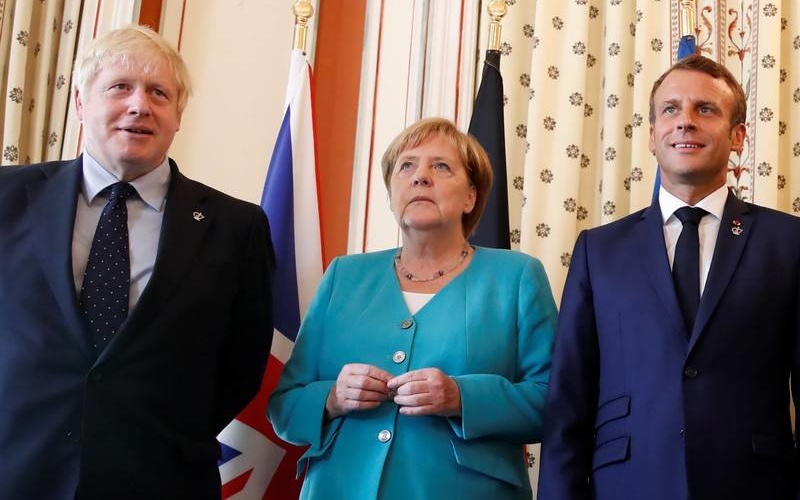French President Emmanuel Macron (R), UK Prime Minister Boris Johnson (L), and German Chancellor Angela Merkel at the G7 summit, Biarritz, France, August 24, 2019 (Christian Hartmann/Reuters)
European powers have blamed Iran for the September 14 drone and missile attacks on two Saudi oil facilities, knocking out more than half the Kingdom’s oil production.
Britain, Germany, and France — all parties to the 2015 nuclear agreement with Tehran — issued the statement on Monday as their leaders met at the opening of the UN General Assembly. They called on the Islamic Republic to agree to new talks about its nuclear and missile programs and regional security issues.
It is clear to us that Iran bears responsibility for this attack. There is no other plausible explanation. We support ongoing investigations to establish further details.
These attacks may have been against Saudi Arabia but they concern all countries and increase the risk of a major conflict. They underline the importance of making collective efforts towards regional stability and security, including finding a political solution to the ongoing conflict in Yemen. The attacks also highlight the necessity of de-escalation in the region through sustained diplomatic efforts and engagement with all parties.
President Hassan Rouhani immediately rejected the statement, as he met French counterpart Emmanuel Macron, as a “groundless blame game”.
Iranian State media tried to distance Macron from the statement with UK Prime Minister Boris Johnson and German Chancellor Angela Merkel. It noted Macron’s comments, published by Le Monde hours earlier, “One must be very careful in attributing responsibility. There are clusters of clues, but this bombardment is a new military event that changes the region’s ecosystem.”
Macron has tried to mediate between Iran and the US, seeking a return to the 2015 nuclear agreement between Tehran and the 5+1 Powers (US, UK, France, Germany, China, and Russia).
But his proposal of a $15 billion line of credit to Iran, amid comprehensive US sanctions following the Trump Administration’s withdrawal from the nuclear deal, has been stalled by the need for Washington’s acceptance and by the attacks on the Saudi oil complexes.
French Foreign Minister Jean-Yves Le Drian told reporters on Sunday that discussions were promising until the “game changer” of the attacks.
Iranian Foreign Minister Mohammad Javad Zarif, also in New York lashed out that Europe “have failed in every single one” of their commitments under the nuclear deal: “They think they need some green light from the US.”
See also Iran Daily: Tehran — No Rouhani-Trump Meeting in New York
In February, Iran rejected a European Union mechanism, known as INSTEX, because of “humiliating conditions” such as the EU’s concern over Iran’s missile program, activities in the Middle East, and alleged involvement in bomb and assassination plots in Europe.
Monday’s statement by the European leaders reiterated: “We reiterate our conviction that the time has come for Iran to accept negotiation on a long-term framework for its nuclear program as well as on issues related to regional security, including its missiles program and other means of delivery.”

